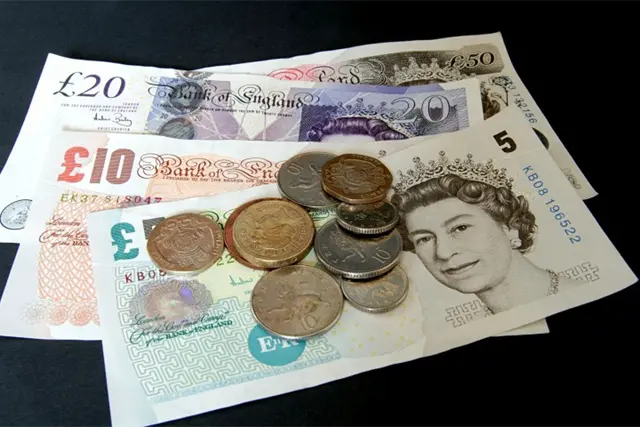The British
pound
took a dive in early Asian trade on Friday, hitting its lowest level since 1985, as traders scrambled to assess the cause of the heavy selling.
The currency tanked as much as 6 percent to $1.1819 and later recovered to hover at the $1.24 handle, down 2 percent, according to Reuters data. Friday's fall was the most aggressive since results of the Brexit vote on June 24, according to spread-betting firm IG.
Market speculation was rife that the decline was the result of a wrongly entered trade.
Because there was no news so far to justify the pound's wild swing, it could be the result of a fat finger, said Elias Haddad, senior currency strategist at Commonwealth Bank of Australia.
John Gorman, head of non-yen rates trading at Nomura Securities, said via email that there were two theories floating around.
"First, it was a fat finger or a trade entered mistakenly. The second possibility, which sounds more reasonable, is that there is a large barrier option that traded and that caused the selloff in light liquidity."
Kathy Lien, managing director of foreign exchange strategy at BK Asset Management, echoed those views.
"It's a low liquidity sell-off. Typically when we see this, the reversal is violent but with fundamental support, the pound could find a new range between 1.22 and 1.25 per dollar," she said in e-mailed comments.
Pound rate Photo: CNBC
Indeed, not everyone believed the fat-finger theory.
"Usually, fat finger errors don't have thecontinuitythat we're seeingrightnow. There's a chance that it might beenanerrorbutI don't thinkwe haven't seen the last of thelows,"Ashraf Laidi, CEO of Intermarket Strategy, told CNBC's "
Squawk Box
."
In a tweet, Laidi remarked that market players were complaining their brokers were not allowing them to close or place new positions.
Others suspected an article from the Financial Times (FT) that revived fears of a "hard Brexit" policy was to blame for Friday's losses.
"The U.K. has decided to do a Brexit, I believe even a hard Brexit. Well, then we must go all the way through the U.K.'s willingness to leave the European Union. We have to have this firmness," the FT reported French President Francois Hollande as saying on Thursday. The FT story was last updated on Friday.
A "hard Brexit" option would essentially involve Britain giving up full access to the EU single market and customs union in favor of making new trade deals.
"A keyword or news-flow focused algorithm started the selling based off that FT article and other algorithm may have seen the momentum coming into the pound at what is normally a relatively low volume time for trading around the start of the Asian session," Angus Nicholson, IG market analyst told CNBC.
"That may have brought in other algorithms, which compounded the selling creating a feedback loop that resulted in a flash crash."
Hollande's comments followed similar remarks by German Chancellor Angela Merkel. On Thursday, Merkel warned that Britain would not receive any special treatment once it left the economic bloc, Reuters and Dow Jones reported.
Pounds sertling with USD Photo: CNBC
Friday's aggressive moves
caps a volatile week for the currency
, bringing its week-to-date losses to over 4 percent, according to Reuters data. On Thursday, it traded around $1.2720 after hitting what was also a 31-year low of $1.2686 on Wednesday.
The selling began to accelerate following British Prime Minister Theresa May's announcement on Sunday that Article 50, a piece of legislation that launches the exit process, could start by the first quarter of 2017.
"At a time when the PM has warned times will be tougher for bankers and when the Chancellor has to go to New York to get deals, you have to ask yourself questions. We haven't even started the Brexit process, so just imagine how bad things could be in March," observed Laidi.
Other currencies were stable on Friday, with the
euro
down 0.2 percent to $1.1130 while theyen
was 0.3 percent lower at $103.57.
Regardless of what caused Friday's plunge, further losses are certainly expected.
"Markets are bracing for more volatility from Brexit uncertainties. Any lawyer can tell you that divorces tend to be messy, complicated, emotional and loud," DBS analysts said in a Friday note.
(CNBC)
 简体中文
简体中文



